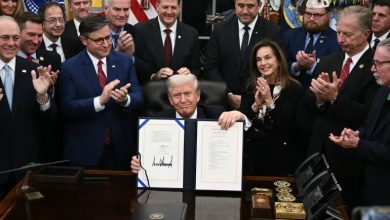Sir Keir Starmer has declined to confirm whether he would relinquish other British overseas territories following the UK government’s decision to transfer the Chagos Islands to Mauritius. The Chagos archipelago, which was under British control since 1814, was handed over in a move the government described as a means to enhance global security and resolve a long-standing territorial dispute. Notably, the islands include Diego Garcia, home to a strategically vital military base used by both the US and UK.
When questioned about whether Labour would guarantee that no further territories would be ceded, Starmer emphasized the importance of maintaining a secure base, stating, “The single most important thing was ensuring that we had a secure base, the joint US-UK base; hugely important to the US, hugely important to us.” He asserted that securing this base was a significant reason for the positive remarks from US officials following the agreement.
In response to Starmer’s statements, a spokesperson for Prime Minister Rishi Sunak clarified that the transfer of the Chagos Islands would not alter the UK’s policy regarding other overseas territories. This reassurance came amidst rising tensions, as just hours later, Argentina’s foreign minister, Diana Mondino, declared the country’s intention to seek “full sovereignty” over the Falkland Islands, which Argentina refers to as the Malvinas.
Mondino welcomed the UK government’s recent decision, viewing it as a step toward ending what she termed “outdated practices.” She vowed to take “concrete action” to secure the cession of the Falklands to Buenos Aires, indicating that Argentina remains steadfast in its claim over the territory. The diplomatic developments reflect ongoing complexities surrounding the status of British overseas territories and the historical claims associated with them.
Grant Shapps, the former Tory defense secretary, criticized Sir Keir Starmer’s decision to cede the British Indian Ocean Territory, asserting that it demonstrates Starmer’s inability to safeguard British interests. He remarked to The Telegraph, “We are fortunate that Starmer wasn’t in charge during the Falklands War; he would have handed them over on a silver platter.”
Starmer has faced backlash from various Conservative figures, including former Prime Minister Boris Johnson, who condemned the move as a result of “sheer political correctness.” Speaking on GB News, Johnson expressed his disbelief, stating, “What is this claim? It’s nonsense, it’s total nonsense. Why are we doing this? It’s sheer political correctness, a desire to appear as the good guys, and an effort to dismantle the last remnants of our empire. It’s nonsense.”
In addition, Nigel Farage called for a parliamentary vote on the matter, insisting that no government should have the authority to relinquish sovereignty without a proper debate. This call for parliamentary involvement highlights the contentious nature of the decision and its potential implications for British sovereignty and territorial integrity. The criticism from prominent political figures reflects deep divisions over national security and the legacy of British colonialism.


